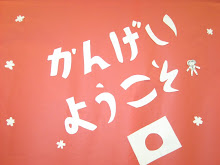Japanese 1
Practice saying days of week, subjects, likes, dislikes, difficult, easy, yucky-tasting, delicious (with respect to subjects, foods, teachers, sports, etc.)
れきし の せんせい の おなまえ は GENSUKI せんせい と BO-DI せんせい と MICHERU せんせい と WAISU せんせい です。
えい語 の せんせい の おなまえ は ADAMUJI せんせい と SUPU-NA- せんせい と RAITO せんせい です。
Check workbook pages 92, 93, 96 (lesson 5 in 1 Kimono), vocab flash cards
Animal words student-generated on board.
Culture: We watched documentary film KODO by French filmmaker Jacques Holender This group will perform at Orchestra Hall next week, the night of February 17th—extra credit if Sensei sees you there)
****Vocabulary test Friday: days of week, likes, dislikes, foods, adjectives (NOT school subjects)****
Japanese 3
REMINDER: Students must choose their authors and books for "Japanese Literature in Translation" project. As of today, only 2 students have had their books and authors approved.
Students spoke in pairs the dialogues they worked on yesterday, then handed in the written versions. Students also handed in summaries of “Setsubun” article.-
New song, 「風」, text seems to be adapted from English poem beginning, “Who can see the wind, neither you nor I…”
Handed out verb list, at request of students – work on numbers 16-26 in deriving plain aff. form and plain neg. form, based on the verb group:
三年生 の 動詞
1。つくります makes
2。あらいます washes
3。およぎます swims
4。すいえい を します does swimming
5。さんぽ を します does walking
6。じょうば を します does horseback riding
7。買いもの を します does shopping
8。【お】じゃま します disturbs/bothers
9。つかいます uses
10。来ます (comes)
11。きます (wears above waist))
12。はきます (wears below waist))
13。はしります runs
14。おきます gets up
15。ねます goes to bed, sleeps
16。見ます sees, watches, looks at
17。食べます eats
18。いただきます humbly receives (before meal)
19。行きます goes
20。聞きます listens to, hears
21。のみます drinks
22。読みます reads
23。まちます waits
24。あびます takes a (shower)
25。かえります (person) returns home
26。ひきます plays (guitar or other stringed instrument)
27。ふきます blows (balloon or trumpet)
28。のばします stretches
29。立ちます stands
30。すわります sits
31。ねじります swivels, twists
32。まわします makes go around
33。はくしゅ します applauds, claps hands
34。すいます inhales
35。はきます (exhales)
36。あそびます plays (in the park, or with a dog, for example)
37。かきます writes
38。さわります sits
39。はなします speaks
40。います exists (animals and humans)
41。あります exists (inanimate things)
42。ございます (humbly) exists
43。会います meets (a person)
44。ふります falls (rain or snow)
45。あけます opens (door, for example)
46。しめます closes
47。買います (buys)
48。かいます (owns/raises pets)
49。わかります understands, knows
50。いいます says
51。あがります goes up (enters by stepping up), rises
52。出かけます goes out (on the town, to a movie, etc.)
53。うります sells
54。とります takes (photos, wallets)
55。入いります enters (bath or pool or room)
56。かします lends
57。サボる cuts class/job
58。しんじる/しんじられない believes/can't believe
60。そうじ を します cleans (house or room)
61。もらいます/もらえます receives/ can receive
62。かかる takes (time or money)
63。ねる goes to bed
64。はじまる starts
65。じゅんび する prepares/ does preparation
66。あさねぼう する oversleeps
67。 ちがう differs/ is different from
68。わたる crosses over (bridge, intersection)
69。まがる turns (left or right)
70。つれる takes/leads (a person to a place)
71。もつ holds/has
72。くりかえす repeats (song lyrics, etc.)
73。けっこん して いる is married
74。なくなる dies (a polite way of saying it about a person)
75。がっかり する is disappointed
76。つかれる to be (become) tired
77。つく to arrive
78。あげる to give (speaker giving "outgoing" gifts)
79。がんばる to try hard/persevere
80。【会社 に】 つとめる to be employed by (a company)
81。びっくり する to be surprised
82。あさねぼう する to oversleep
83。まける to lose (a game or contest or war)
84。かつ to win (a game or contest or war)
85。わすれる to forget
86。出る でる to leave, to emerge
87。出す だす to put out/ take out/ issue
88。ゆうしょう する to win the championship
89。りょこう する to travel
90。かえす to return a thing to its original place
(book to library, for example)
91. かよう to commute
Plain negative present sentences that also review relational particles.— in-class work, translate into English
ねこ は りす と あそばない。
なまけもの (lazy person) は ごぜん 五時 に おきない。
せいと は 大阪 の うた を うたわない。 せんせい は セーター を きない。
ミルウオーキー で 日本語 の 先生 に あわない の?
たかしまや デパート で 大きい くつ を 買わない。
いい 学生 は ぜんぜん 大学 の クラス (じゅぎょう) を サボらない。
スターバックス に あまり 出かけない。 ドイツ語 を はなして いる。
なぜ うち に かえらない の?
まい日 お父さん は かいしゃ に かよわない。
兄 は まだ けっこん して いない。
****There will be a test on verb forms on Friday****
Japanese 2
Went over page 49 in the workbook and had kids write answers on the board. Many problems with writing カタカナ、ローマじ, and かんじ{食べます、行きます}and corrections were made on board. Students then read each other’s answers and wrote corrections in their notebooks.
"Scantron final and writing sample" grade IS ON GRADEQUICK. Anyone who can't find the grade can get a printout from Kimmel Sensei.
New song, 「風」, text seems to be adapted from English poem beginning, “Who can see the wind, neither you nor I…”
Homework: write the training schedule of a famous athlete, using the same kinds of sentences we worked on in 2 Kimono Lesson 5, in the workbook and in the text.
Japanese AP/4
Discussion of homework assignment, Yookoso: Continuing … workbook pages 172, 174-5 (K and L) Difficulties with L – we will research further
Culture: We watched documentary film KODO by French filmmaker Jacques Holender This group will perform at Orchestra Hall next week, the night of February 17th—extra credit if Sensei sees you there) Discussion with Imaoka and Dow, who have percussion experience.
Homework for all:
Be prepared to describe, out loud, your morning (usual morning or a particular morning), speaking from prepared notes, but not sentences. Refer to 日本との出会い:第五課
New song, 「風」, text seems to be adapted from English poem beginning, “Who can see the wind, neither you nor I…”
Subscribe to:
Post Comments (Atom)

No comments:
Post a Comment